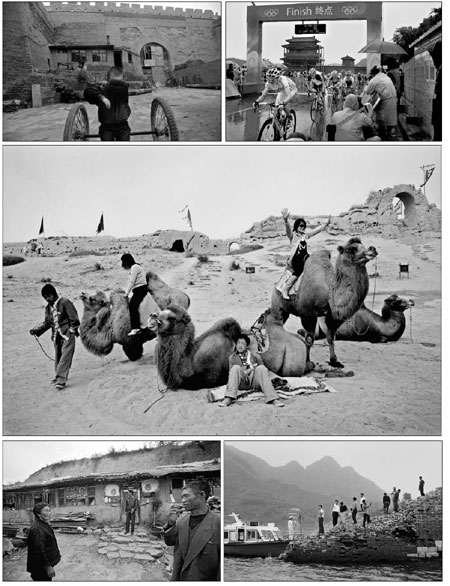|
Great Wall album
2012-01-08 08:01:00 / China Daily

An end-to-end media tour of the Great Wall has kept a Beijing photographer in thrall for years, Mike Peters reports.
'Out in the western parts of China, 80 percent of the Great Wall looks pretty much like this," says photojournalist Zhao Qing, pointing to an image of goats being herded over a long, low mound of pounded earth in Gansu province. "There aren't many visitors out there."
Despite that lack of architectural grandeur that sends tourists' hearts and camera shutters aflutter on the postcard parts of the Wall, Zhao was fascinated by a month-long media tour of the entire structure in 2006. He'd planned to make a polite getaway after the first week, he says with a laugh. But five years later, he's still on the journey that has taken him to see monks repairing the Wall in Shaanxi province, camel drivers in Ningxia, miners in Fugu county, a massive Buddha on a Hebei hillside and Olympic cyclists in Beijing.
 Clockwise from top left:
Clockwise from top left:
2006: A kid cries inside the wengcheng (enclosure for defense outside a city gate) of Yulin, Shaanxi province. The ancient city enjoyed a key position in the Great Wall defense system during the Ming Dynasty. In March 2007, two construction workers died in a collapse during the repair of the city wall.
2008: Athletes from different countries crash through the finish line at Juyongguan in the rain during the road cycling competition of the Beijing Olympic Games.
2009: Tourists ride camels in the Zhenbeibao West Film Lot in Yinchuan, capital of Ningxia Hui autonomous region, near a primitive stretch of the Great Wall.
2006: In the Rutou village of Yanggao county in Shanxi province, the Great Wall serves as the back wall of many houses built right up against it.
2007: Visitors who arrived by steamboat climb on the remains of a Great Wall section that was flooded by Panjiakou reservoir in Xifengkou, Hebei province.
"The Great Wall is a powerful symbol of Chinese traditional culture and has become the pride of the Chinese nation," he says. "But few people, even Chinese people, have an idea of the true situation of the Wall and people who live there."
Capturing the stories of those people has become a mission for Zhang, the photo editor of China Youth Daily in Beijing. He hopes to publish a book that will bring life in the shadow of the Wall into sharp focus.
"Many villages near the Great Wall are sleepy now, especially in poor areas in northwest China. Most young people move to big cities or rich areas to search for jobs because of the difficult natural environment. And portions of the Great Wall disappear nearly every day."
Floods and sandstorms have eroded the wall for centuries, especially those sections that were little more than tamped earth barriers connecting watchtowers. And until a very recent enthusiasm for conservation took hold, humans have been literally taking the Wall apart since its military use was lost, especially during the "cultural revolution" of 1966-76.
"In hard times, people would dig holes in the Wall to live in," he says. "In the 1960s, it was common for people to use bricks from the Wall to build houses." Sometimes they didn't go too far, building three walls right up against the Wall itself. "That's forbidden now," he says, "but many of the existing houses are still in use to avoid displacing people."
Zhao's photos avoid displacing people as well. While full-color vistas of a seemingly endless Great Wall are the stuff of tourists' dreams, Zhao's images are starkly black-and-white. That, he says, keeps the viewer focused on human faces without the distraction of pretty scenery and grand architecture.
"My theme is not the Wall itself but the different projects and stories of people whose way of life can be traced to ancient times," he says. So his portfolio includes monks who are restoring the Wall to improve the environment around their temple, tearful mothers at weddings and funerals, miners who feel powerless to complain about local water pollution, and al fresco diners at a restaurant at Zhanghaiguan.
"The Wall can collect anything that you can imagine," he says. "It's like a stage, where everyone can perform."
You can contact the writer at michaelpeters@chinadaily.com.cn.
(Written by Mike Peters)

|

